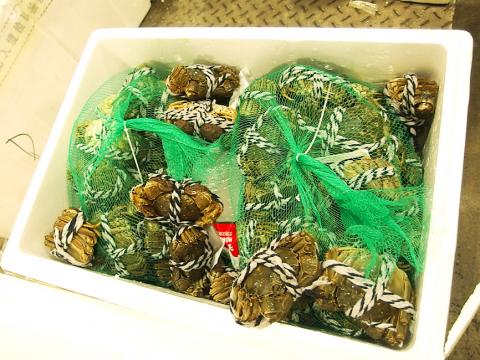Eight shipments of crabs imported from China have failed dioxin tests this year, the Food and Drug Administration (FDA) said yesterday, adding that two companies face combined fines of more than NT$100 million (US$3.25 million).
The FDA last week reported that 14.954 tonnes of hairy crabs — also known as Chinese mitten crabs, a seasonal delicacy in Taiwan, Hong Kong and China — imported in three batches from China were found to exceed minimum dioxin standards.
Two batches were imported from Anhui and Jiangxi provinces by Ciaoaibo International Enterprises (喬艾舶國際企業), and the other was imported from Anhui Province by Youfong Enterprises (侑豐企業), the FDA said.

Photo: CNA
The crabs were found to have residual dioxin and dioxin-like polychlorinated biphenyls (DL-PCB) exceeding maximum allowable residue levels of 3.5 picograms per gram for dioxin and 6.5 picograms per gram for DL-PCB, the agency said.
About 3.5 tonnes imported by Ciaoaibo International are missing, possibly sold illegally before the inspection results were completed, it said.
The FDA said it has conducted special inspections of imported crabs in cooperation with the Coast Guard Administration, the Seventh Special Police Corps and local health bureaus, which found five previous batches of dioxin-contaminated crabs, with a combined weight of about 25.3 tonnes.

Photo courtesy of the Food and Drug Administration
Two batches from Zhejiang Province and one from Jiangxi Province were imported by Ciaoaibo International, one batch imported by Youfong was from Anhui Province and one batch was imported by Yuetzu International Trading Co (約諮國際貿易) from Hunan Province, the FDA said.
About 5.8 tonnes imported by Ciaoaibo International or Yuetzu International are also missing, it said.
The FDA said that it has inspected 42 batches of hairy crabs from China so far this year, with eight batches (40.2765 tonnes) exceeding allowable levels of dioxin and DL-PCB, while 9.3126 tonnes were unaccounted for.
FDA Northern Center Deputy Director Cheng Wei-chih (鄭維智) said the missing crabs were being traced and the case is being handled by prosecutors.
The FDA will fine Ciaoaibo International NT$98.4 million and Yuetzu International NT$18.4 million for breaches of the Act Governing Food Safety and Sanitation (食品安全衛生管理法), Cheng said, adding that companies found to have broken the law would be dealt with strictly.

NATIONAL SECURITY THREAT: An official said that Guan Guan’s comments had gone beyond the threshold of free speech, as she advocated for the destruction of the ROC China-born media influencer Guan Guan’s (關關) residency permit has been revoked for repeatedly posting pro-China content that threatens national security, the National Immigration Agency said yesterday. Guan Guan has said many controversial things in her videos posted to Douyin (抖音), including “the red flag will soon be painted all over Taiwan” and “Taiwan is an inseparable part of China,” while expressing hope for expedited “reunification.” The agency received multiple reports alleging that Guan Guan had advocated for armed reunification last year. After investigating, the agency last month issued a notice requiring her to appear and account for her actions. Guan Guan appeared as required,

Japan and the Philippines yesterday signed a defense pact that would allow the tax-free provision of ammunition, fuel, food and other necessities when their forces stage joint training to boost deterrence against China’s growing aggression in the region and to bolster their preparation for natural disasters. Japan has faced increasing political, trade and security tensions with China, which was angered by Japanese Prime Minister Sanae Takaichi’s remark that a Chinese attack on Taiwan would be a survival-threatening situation for Japan, triggering a military response. Japan and the Philippines have also had separate territorial conflicts with Beijing in the East and South China

A strong cold air mass is expected to arrive tonight, bringing a change in weather and a drop in temperature, the Central Weather Administration (CWA) said. The coldest time would be early on Thursday morning, with temperatures in some areas dipping as low as 8°C, it said. Daytime highs yesterday were 22°C to 24°C in northern and eastern Taiwan, and about 25°C to 28°C in the central and southern regions, it said. However, nighttime lows would dip to about 15°C to 16°C in central and northern Taiwan as well as the northeast, and 17°C to 19°C elsewhere, it said. Tropical Storm Nokaen, currently

PAPERS, PLEASE: The gang exploited the high value of the passports, selling them at inflated prices to Chinese buyers, who would treat them as ‘invisibility cloaks’ The Yilan District Court has handed four members of a syndicate prison terms ranging from one year and two months to two years and two months for their involvement in a scheme to purchase Taiwanese passports and resell them abroad at a massive markup. A Chinese human smuggling syndicate purchased Taiwanese passports through local criminal networks, exploiting the passports’ visa-free travel privileges to turn a profit of more than 20 times the original price, the court said. Such criminal organizations enable people to impersonate Taiwanese when entering and exiting Taiwan and other countries, undermining social order and the credibility of the nation’s